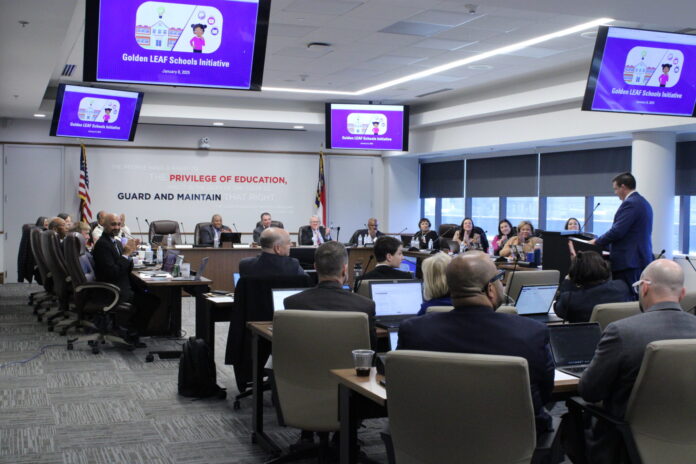The state will select 20 middle schools this summer across rural North Carolina to participate in a five-year Golden LEAF Schools Initiative, a project announced Wednesday by Superintendent Mo Green at the first State Board of Education meeting of his term.
A grant of $25 million from the private nonprofit Golden LEAF Foundation will fund curricular resources, intensive coaching and professional development for teachers, and other incentives to raise math achievement, boost career exploration, and shift participating schools toward competency-based education.
“The Golden LEAF Schools Initiative is an important step toward achieving my vision: ensuring every child in North Carolina’s public schools achieves educational excellence,” Green said. “In order for North Carolina’s public schools to become the best in the country, we must rethink how we approach teaching and learning, and we must provide our schools with the appropriate support to do so.”
Pending the State Board’s approval Thursday, applications for the initiative will go live Jan. 13 and be open until March 21 to middle schools in rural counties that are considered Tier 1 or 2 counties in rankings of economic well-being by the state Department of Commerce. Both the school and district leader must be on board, presenters said Wednesday.
The project has two cohorts, one focused on turning around low-performing schools, called the “transformation schools cohort,” and one focused on breeding innovation, called the “personalized, competency-based education cohort.”
The initiative is more intensive for the first cohort. Each school in the “transformation schools cohort” will receive about $1.69 million over five years, while each school in the cohort focused on innovation will receive about $381,000 over five years.
The Golden LEAF Foundation, Department of Public Instruction staff, and former Superintendent Catherine Truitt have been forming the project for 18 months, presenters said Wednesday. Green thanked Truitt for her work.
“I also want to take this opportunity to recognize the great leadership of former Superintendent Catherine Truitt, who played a pivotal role in leading the development of this initiative in partnership with the Golden LEAF Foundation,” Green said. “Her vision, dedication, and commitment to improving educational outcomes for North Carolina’s students were instrumental in making this initiative possible. We are proud to build upon the work that she started and look forward to continuing her legacy of innovation and excellence in education.”
Scott Hamilton, president and CEO of the Golden LEAF Foundation, said the organization’s support is aimed at workforce development in rural parts of the state. The initiative will be evaluated for potential expansion, both by DPI employees and public and private university faculty through the NC Practitioner Network.
“We know the importance of developing a workforce in rural communities that meets the needs of local employers and how critical it is for that work to be started early in a student’s journey,” Hamilton said. “This initiative not only addresses immediate educational needs, but also sets a precedent for future scalability and success, something Golden LEAF is familiar with from our history as an early funder for digital learning, which helped pave the way for statewide implementation. We look forward to seeing the positive impacts that this will have on all students, educators and communities across North Carolina.”
‘We do want to see public education thrive’
Green, a Democrat, ran his campaign in the fall on educational excellence and character. Wednesday’s announcement, he said, is “a game-changer for North Carolina.”
As Green settles into this role, he has high expectations for moving public schools forward, he said Monday in an exclusive interview with EdNC.
“The only option is for us to strive for excellence,” Green said.
In this transition period, Green is seeking to listen to individuals internally and externally before assembling a strategic plan.
For example, he wants to meet with General Assembly members of both parties to better understand where there are opportunities to work together. He is optimistic, he said, that there will be opportunities to uplift public education in the Republican-led legislature during this year’s long session.
“Part of that belief is built on the fact that I do think that there are many, many folks who do still believe strongly in public education, and want to see that it does well in servicing most of the school-aged children in North Carolina,” he said.

“That is not to suggest that there aren’t going to be issues where there’s going to be disagreement or different ways to view what’s the right and appropriate priorities, but I think that we’ll come at it with this sense of, we do want to see public education thrive.”
His No. 1 priority, he said, is raising educator pay, though a shared legislative agenda with the State Board will have more specifics.
“We’re at a place where, for us to recruit and retain and grow the educators that we want to be with our students, it’s going to require an increase in their base compensation,” he said.
He also wants to learn from parents who are choosing educational options outside of the public school system, such as parents who home school their children and parents who participate in the state’s private voucher program.
“I want to understand what’s behind those decisions, because they may impact how we do our work in elevating public education,” Green said.
More resources are needed to do right by students, he said.
“I typically don’t start within other organizations with a deep concern about the amount of resources that are available, but I am deeply concerned about the level of resources that are currently being provided to North Carolina public schools,” he said. “When you look at any number of metrics, we find ourselves at or near the bottom with regards to funding.”
As the superintendent of Guilford County Schools during the Great Recession, Green gained experience in leading schools through times of uncertainty and resource scarcity. He compared that period to today’s environment, in which some education leaders worry about the financial impacts of voucher expansion on traditional public schools.
“Our students still need to be educated at the highest levels,” Green said. “They don’t get a chance for another tomorrow, and so the expectations for them do not change.”
‘Every middle school math teacher’s dream’
The Golden LEAF Schools Initiative is built on the Marzano High Reliability Schools framework, which aims to “drive permanent, positive, and significant impacts on student achievement by synthesizing multiple complex initiatives into one harmonious system,” according to the Marzano Resources website.
DPI will host multiple information sessions for eligible and interested schools in the coming weeks. After the application window closes in March, DPI will conduct three tiers of interviews and application reviews. The State Board will vote on the proposed schools on June 5.
The initiative is particularly focused on improving student performance in math in the cohort consisting of low-performing schools, said Andrew Smith, DPI’s deputy superintendent of the Office of Innovation.
Smith said this focus came from studying academic data since the pandemic and seeing substantial decreases in end-of-grade math performances in grades six, seven, and eight.
“We kept drawing our attention back to middle school math,” he said. “It’s an area that we don’t have lots of policy to support. There’s not a lot of funding to support it, either.”
Heather McDonald, the state Teacher of the Year from Haywood County, said she appreciates the initiative’s support for middle school, for math instruction, and for career exploration.
“Math has to be real-world for our students, just like our education has to be relevant to what they’re doing,” McDonald said. “I’m very, very appreciative of it… This is every middle school math teacher’s dream.”
